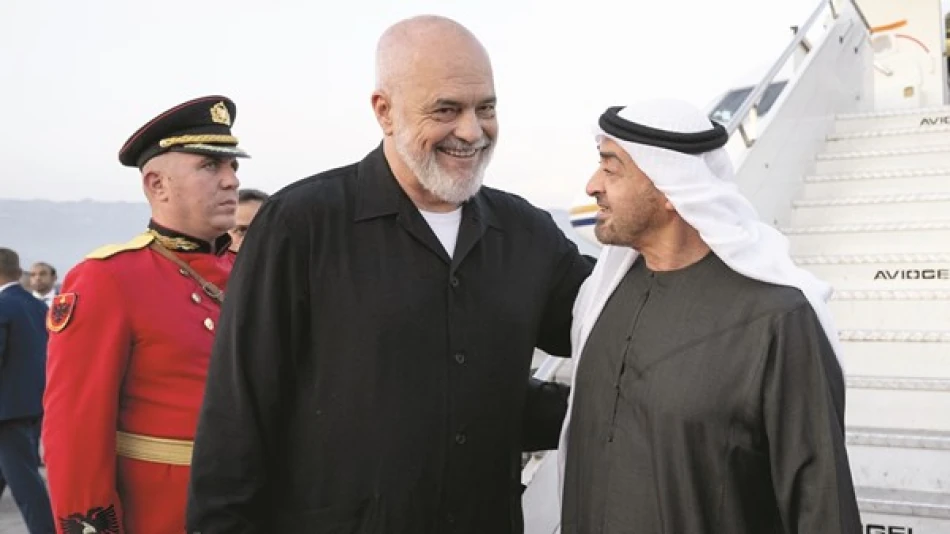
State Leader and Albanian PM Discuss Bilateral Relations, Strengthening Ties
UAE President's Historic Albania Visit Signals Middle East Push into Balkan Markets
UAE President Sheikh Mohammed bin Zayed Al Nahyan's working visit to Albania marks a strategic pivot as the Gulf powerhouse seeks to establish deeper economic footholds in the Balkans, with renewable energy, food security, and technology emerging as key cooperation areas. The visit culminated in Sheikh Mohammed receiving Albania's highest honor, the "Benimerenti" medal, underscoring the growing diplomatic and economic ties between the two nations.
Strategic Dialogue Beyond Traditional Partnerships
During his meeting with Albanian Prime Minister Edi Rama in Tirana, Sheikh Mohammed emphasized the UAE's commitment to strengthening relationships across the Balkan region, with Albania positioned as a gateway market. The discussions centered on priority development sectors including economic cooperation, trade expansion, renewable energy projects, food security initiatives, and technology transfer.
This diplomatic engagement reflects the UAE's broader strategy of diversifying its international partnerships beyond traditional Middle Eastern and Asian markets. Albania, as a NATO member and EU candidate country, offers the UAE a strategic entry point into European markets while providing Albania access to Gulf capital and expertise.
Economic Implications for Both Nations
UAE's Balkan Strategy
The UAE's interest in the Balkans comes at a time when the region is experiencing significant economic transformation. Albania's strategic location along the Adriatic coast, combined with its growing energy sector and EU accession prospects, makes it an attractive partner for Emirati investment. The presence of Mohamed Alabbar, chairman of Eagle Hills, in the UAE delegation signals potential real estate and infrastructure investments similar to those the UAE has pursued in Serbia and other Balkan markets.
Albania's Gulf Pivot
For Albania, strengthening ties with the UAE represents an opportunity to diversify its economic partnerships and attract much-needed foreign investment. The country's renewable energy potential, particularly in solar and wind power, aligns with the UAE's expertise in sustainable energy development through companies like Masdar.
Regional Security and Diplomatic Coordination
Both leaders emphasized the importance of international cooperation in conflict resolution through dialogue and diplomatic channels. This discussion comes as the UAE positions itself as a regional mediator, while Albania seeks to contribute to stability in the Western Balkans ahead of its EU integration process.
The timing of this visit is particularly significant given ongoing geopolitical tensions in Europe and the Middle East. The UAE's engagement with Balkan nations demonstrates its commitment to maintaining diverse international partnerships while supporting regional stability.
High-Level Delegation Signals Serious Intent
The composition of the UAE delegation, including Deputy Prime Minister Sheikh Abdullah bin Zayed Al Nahyan, Minister of Industry and Advanced Technology Dr. Sultan Al Jaber, and several other senior officials, indicates the strategic importance the UAE places on this relationship. Such high-level representation typically precedes significant investment announcements or partnership agreements.
Looking Ahead: Investment and Partnership Potential
The awarding of Albania's highest honor to Sheikh Mohammed suggests that concrete cooperation agreements may follow this initial diplomatic engagement. Key sectors to watch include renewable energy infrastructure, where the UAE's expertise could accelerate Albania's green transition, and technology transfer programs that could benefit both nations' digital transformation goals.
This visit represents more than ceremonial diplomacy—it signals a calculated expansion of UAE influence into European markets through strategic Balkan partnerships. For investors and regional observers, the UAE-Albania relationship could serve as a model for similar Gulf-Balkan cooperation frameworks, potentially reshaping economic dynamics in southeastern Europe.
Most Viewed News

 Layla Al Mansoori
Layla Al Mansoori






